LittleThings

Behzād: Yusuf and Zulaikha [Joseph chased by Potiphar's wife] (1488)
A Persian Miniature- A LittleThing
"The lovely Beaux Arts theater stands empty but still as beautiful as it ever was."
No Colossus of Rhodes guards our harbor. Heck, we don't even have a harbor. At night, the first evidence that you're approaching a small city tends to be the lights glaring up from the penitentiary, which produce a false sunrise on the eastern horizon all night long. During daylight, a vast debris field of derelict train cars surrounds two long-abandoned grain elevators. A single tall-ish tower of a building looks out of place beside blocks of much shorter structures, some dating back much more than a hundred years, but many evidence that the fifties and sixties passed through here and set down roots. A few motels flank the few exits from our short miles of four lane designed to route traffic around rather than into here. The welcome seems less hostile than indifferent. Few cues immediately suggest that this place is different from any other dusty western city. The differences lie deeper, within LittleThings.
A local college whose sports teams were until recently called The Missionaries maintains the obligatory Gothic architecture section of town.
ComingTrue

Jean-Honoré Fragonard: The Swing [French: L'Escarpolette],
original title The Happy Accidents of the Swing
[French: Les Hasards heureux de l'escarpolette]. (c. 1767)
"I hope that I never successfully catch up to anything but continuing pursuit."
Few experiences seem so damning as a decent blessing. Give me a dream ComingTrue and a raft of childhood training kicks in, lessons cautioning about hatching chickens, gift horses, and turning worms. The subtext of all of them seemed to focus on the inevitable fickleness of fate. Good luck prefaces bad. Success breeds failure. Lucky streaks end. Eventually, we're all damned. My parents were no pessimists, but they'd lived through The Great Depression, experiencing how wishing doesn't always make things so and just how cruel life can sometimes feel. They'd counsel us kids to never prop our hopes up too high. I guess they were lovingly trying to prevent us from injuring ourselves when (not if!) we fell. The lesson I took away told me to stay low to the ground, not precisely crawling everywhere on my belly, but by all means, staying off high horses. It probably didn't help that when I was five, a neighbor invited me to ride her enormous horse, which I promptly fell off of. We ultimately teach ourselves life's lessons, often by misconstruction.
I should not feel at all surprised if I instinctively duck when I experience good luck.
MistInformation

Caspar David Friedrich: Mountain Landscape
[Felsenlandschaft im Elbsandsteingebirge] (1822-1823)
"Our truths seem no more self evident than they were ever the truth."
I reckon that about half of what I believe might well prove false over time. My reckoning does not resolve the underlying errors. It just keeps me watchful. At any time, new information might undermine one of my more fundamental beliefs. I release these with little evident elegance, usually by means of mentally kicking and screaming in denial before relenting. I do not always relent. Consequently, I live beneath a true patchwork of notions, some fact-based and most perhaps firmly rooted in emotions. I hold my convictions, some more lightly than others, but my belief system, probably like yours, stands like a teetering house of cards. My cognition, the order-making part of my orientation, rarely questions the basis behind any of my beliefs. Most might well be little more than mist, but they still work for most intents and purposes. I'm prejudiced and I know it, though I only rarely ever feel anything like a brunt of its effects. I'm no scientist, no professional skeptic, no cynic, neither. I hold my truths as self-evident, even and perhaps especially the ones which never really qualified as truths and whose self-evidence only works when I'm not trying to explain them to anyone, even myself. I probably base about half of my of understanding of this world on MistInformation, perhaps much more.
I do not feel especially cursed by my condition, but mostly more blessed because of it.
Pariahing

Henry Fuseli: The Night-Hag visiting the Lapland Witches (1796)
" … we'll show them and harm ourselves."
An appalling ineptitude has taken over the delicate art of Pariahing, the practice of fulfilling the many duties and responsibilities pariahs have been called to practice throughout the ages. I write this morning to clarify these expectations by enumerating the many shortcomings I've been noticing of late. Our recently unseated President, who might have better exemplified pure pariah had he been better informed in the details of his chosen profession, stands as perhaps the prominent example of how Pariahing's not to be done in practice, for he blundered his golden opportunity and encouraged a raft of fresh but sadly inept pretenders into this delicate profession. A decent pariah remains first and foremost unaware of his designation. One cannot simply mimic and expect to get away with the performance. I cannot over-stress the ultimate importance of obliviousness, for this one element seems key. One must never suspect that they are the pariah everyone's whispering about. Deliberate Pariahing's an oxymoron. Still, even the oblivious seem in need of a little coaching and I will attempt that task here, though I understand from this outset that it's very unlikely to do any good and might render me into the pariah I'm coaching.
My heartfelt reaction to the recognition that some held me as a pariah was, as it properly should have been, denial and deflection, for I could not bring myself to believe it.
SoapOperaing

Henry Fuseli: Oedipus Cursing His Son, Polynices (1786)
"I try to remember that they're just as actively making up stories about me …"
When we were in exile, The Muse and I received periodic updates on the ongoing soap opera back home, though we were only rarely cast in any direct role in the performance. We could watch, amused or critical, from our distance and tisk or cheer as each summary inspired us. We lived, I guess, as relative gods there in that we could do little more than sit on our cloud and watch the play unfold beneath us, and we experienced a distinct beneath down there, for we were above those freys. Not that we were any better than any of the direct performers, but we could watch with unavoidable detachment. Of course we imagined that had we been there to exert influence, some of the more tragic outcomes might have been avoided, but we dared not dwell on the guilt we might have felt at missing the performances without sacrificing our already tenuous sanity. Being away's hard. Harboring begrudgement about it, only worse.
Returning, though, we're immediately cast into more active roles in the ongoing passion play.
FortuneTelling

Eugène Delacroix - Lycurgus Consulting the Pythia (Circa 1835-45)
"I'm reaping precisely what I've sown."
Moving injects mystery back into a life. Like shuffling a deck of cards, the mere act of boxing up possessions transforms them into both more and different from whatever they previously seemed. Perhaps the act of boxing increases their potential which, through continual proximity, had before grown narrow and familiar. The labeling helps amplify the mystery. In a packing frenzy, we did not provide the most descriptive possible labeling, choosing to broadly classify contents and likely target room within which they belonged. Quite a few of the boxes contained contraband which could not quite qualify as kosher according to a stricter reading of our agreement with the movers. Prominent among those were the contents of the many, many boxes simply labeled Basement Pantry, for they largely contained home-canned jars of various provisions: Our precious tomatoes and their variants, roasted, nectar, and juice; My sacred stocks: goose, chicken, veal, and beef; The Muse's jams and jellies: Mirabella, apricot, apple, and apple butter; along with various and sundry leftovers from my over-large batches of beans and stews: pease porridge, pork and beans, green chile chicken stew, and quite a few never properly labeled quarts which appear to contain barf.
These boxes sat for a month moping outside our basement pantry, an unheated corner of the venerable basement featuring crooked wooden shelves, crumbling concrete walls, and a perfect year-round wine cellar temperature.
Reclamating
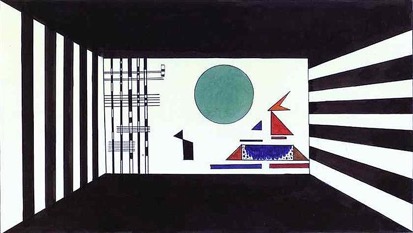
Wassily Kandinsky: Picture II, Gnomus.
(Stage set for Mussorgsky's Pictures at an Exhibition in Friedrich Theater, Dessau) (1928)
" … we're encased within this richer story …"
I say nothing profound when I reflect that we came to reclaim a home that was no longer here. We'd helped make it disappear over our long exile years. I'd returned one spring to strip the exterior to bare wood and repaint, with considerable help from my brother, his now deceased wife, and several other family members and friends. We replaced the clunky old furnace in abstentia, long distance, and by all appearances, were somewhat taken advantage of by the contractor, though our air conditioner could probably cool a typical open air baseball stadium. We replaced the roof and relocated gutters and removed and repoured front sidewalks and steps. We returned to "help" remodel the kitchen, six weeks of surprise and discovery resulting in a uniquely satisfying space. Amy's son Graig completed a thousand improvements, sometimes in lieu of paying rent and sometimes because he just could not bear not to do it. He replaced living room floors with lovely vinyl planking leftover from our venerable local hotel's remodeling. His partner Shar painted walls and worked the gardens into something far more sustainable than what we'd left. Though we're undoing some of their changes, the bones of the place are different. I keep bumping into remnants of the former place as we reinhabit what's left of it.
My legs remember the cadence of the stairways, the basement set completely different from the grand set sweeping up to the second floor bedrooms and offices.
Eatin'Grass

Wassily Kandinski: Mild Process (1928)
"Ah, progress!"
I feel proud to report that I have become a master at another immature technology. Immature technologies seem to find me and I reliably imprint upon them, losing any prior ability to get along without them. I come to depend upon them in symbiotic ardor though they never mature beyond the point where they work in any way reliably. I won't mention the most prominent of these, our ever-humbling internet, for its become too ubiquitous to warrant even a passing mention. Today, I want to explain my relationship with the ever-humiliating weed eater, a garden implement of sorts which has never once so far in its surprisingly long history, lived up to its promise or its promotion. It was a brilliant idea which was apparently never destined to grow into a viable product yet still somehow managed to become ubiquitously popular. Everyone's got one and everyone figures that they're the only one who never quite figured out how to use it. Mastery of such machinery can be tricky because it does not translate into the usual fluid use of it, but demands a more Zen-like acceptance of its inherent limitations. Mastery means accepting such technology for what it is, not what it could never become, and humbly continuing to engage with it anyway.
The weed eater, one of the very few powered tools I allow in my garage, seems simple enough on the surface.
Momenting

Attributed to Ridolfo del Ghirlandaio: Allegory (circa 1498)
"What's left seems immediately lightened, but only because it is."
Back when I was still trying to teach people how to manage projects, interested clients often asked if my work scaled. They'd seen it work with a small team, but they hoped that it might be distributed more broadly. One prospective client proudly proclaimed that he had 33,000 people who desperately needed whatever it was I was offering. "Does it scale?" he asked, without even the barest hint of irony. I clearly recall how much I wanted to reply with a sanguine, "Of course," but, of course, I could not. I'd never attempted to mass distribute whatever I dealt in. It had not occurred to me even though I'd been exposed in business school to the cherished notion of mass production. I was not dealing with widgets, but more personal stuff. Some clients wanted me to train their trainers to broaden exposure to my ideas, but the trainers they presented for training carried medieval notions of their role, most firmly believing that they would be passing knowledge rather than encouraging individuals who probably already knew much better than any trainer ever could just what they needed to succeed. Mass distribution works best when filling empty boxes. I ultimately came to accept that my only ethical response to the scale question was some variant of, "Of course not."
Science, too, struggles with questions of scale.
WeeHours

Henry Fuseli: Titania and Bottom (Circa 1790)
"A single white feather floats down into the yard …"
I follow my cell phone's light down the stairs, careful that I don't disturb The Muse with glaring or trip over one of the cats, who appear like phantoms, hopeful for treats. My day has started. I reset the furnace and put on a coat, for this old place grows chilly overnight and it takes a while to warm back up. I distribute kitty treats, usually on top of the kitchen table. A bad habit, The Muse insists, but one I feel no urgency to break. I find a seat by the tall front window looking out into the street and the T-shaped intersection that violates every possible feng shui principle. There's never any traffic. The street light sheds more light into my eyes than down onto the road surface. The cats will shortly join me staring out into the not yet morning. Two or three hours stretch before me, time before The Muse gets up when I am the undisputed master of this small universe. I read through the papers in response.
An hour later, sun still not even hinting at ever returning, I set aside my papers.
Thwartal
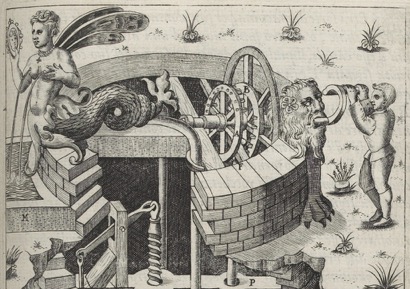
Illustration from Agostino Ramelli’s Theatre of Machines (1588)
"A moment of reverent silence in homage, please."
Thanks to recent advancements in technology, I yesterday renewed a prescription in a mere three and a half hours. The process fully respected my need for privacy and also afforded me the opportunity to catch up on some reading, as I spent much of the time waiting, on hold. A so-called portal stands as the centerpiece of this marvelous system, for it serves as the sole access point for contacting my primary care physician. Should I need to send my nurse practitioner a message, for instance, I need not simply send her a message but rather I'm directed to log into the portal and send it from within there, where editing software apparently lifted from an early prototype of an actual online text editing system circa 1993, awaits my request. From there, my message, theoretically, will be easily routed to the practitioner's queue for review and response. The whole deal depends upon my logging into the portal. The sole design flaw seems to be that the portal makes it impossible for me to log into it due to technical limitations like it just does not work. I usually just call and explain that the danged portal denied me access again and attempt to leave an actual message with the practitioner, and this tactic sometimes even works, though not always. It does work considerably more reliably than does the portal, which I appreciatively refer to as The Thwartal.
The Thwartal exists for the apparent purpose of denying users access to it.
HomeComings
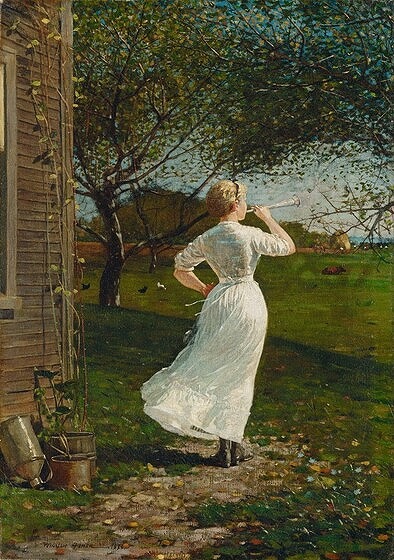
Winslow Homer: The Dinner Horn (Blowing the Horn at Seaside), 1870
"The rest of that return trip flowed like liquid chocolate …"
The first arrival, that homecoming accompanied, if only in my head, by a small parade and speeches, sure seemed like the true arriving. A Pilgrims at Plymouth Rock sort of moment, but reflect for a second on just where those pilgrims landed. Not in a familiar neighborhood, but on a rocky and unpromising, utterly alien shoreline which they only intended to call their home. It was certainly not their home yet. They hadn't earned any right to claim ownership except for the fact that its then current inhabitants didn't believe in ownership. They were into stewardship instead, and generations of their people had earned the right to call it home by dint of more than their presence there. I imagine that later, ten years on, a pilgrim left to conduct some business back with the backers in England and, upon returning, experienced more of a homecoming, the first of a likely succession of them replayed wherever leaving then returning again. Homecoming sort of requires a home to come into, and cannot be rightfully claimed or experienced until returning after an absence.
And so it came to pass, that after three weeks of SettlingInto, The Muse and I left to visit family over the weekend.
Hotel

Edward Hopper: Hotel by a Railroad (1952)
"Hostility demands so very little of us other than that we swallow hard, bear it, and tip it a fiver."
Though I've stayed scores of nights in dozens of hotels, I retain romantic notions about them. They're largely unrequited. I've spent sleepless nights in spare flophouses and also in four star suites and have found their similarities more prominent than their differences. Some rooms barely qualified as closets and others had the bathroom down the hall, but all seemed more similar than different, each of a common class. Hotels proclaim themselves The Hospitality Industry, but they might more truthfully advertise themselves as comprising The Hostility Industry, for a certain disdain for guests seems common from marbled lobby operations to caged-in cashier joints. I suppose this result eventually just comes with the territory. Prolonged proximity to humanity can sour optimism with a seemingly well-earned cynicism, I suspect. Everything has a price and that price tends to be set at about two and a half times the going rate elsewhere, due to unavoidable hospitality charges and largely well-founded preemptive presumptions that the typical guest holds no reasonable recourse, not to mention municipal fees and taxes. Dollars and fivers exchange hands in surreptitious silence as bags are carried and taxis called. They "Sir" me an obsequious lot. This leaves me feeling more suspicious than welcomed.
For those who strive to inhabit a pedestal, I suppose hotel living's a dream come true.
Patriarching
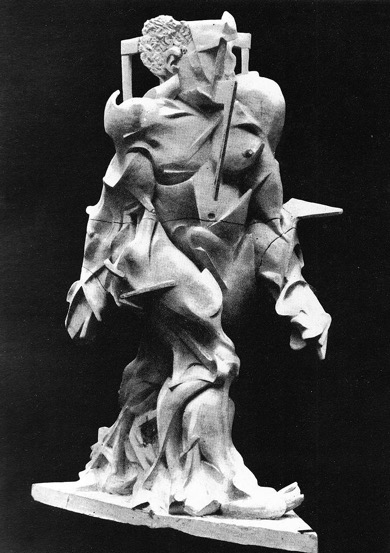
Umberto Boccioni: Synthèse du dynamisme humain [Synthesis of Human Dynamism] (1913)
"Agelessly aging."
No formal course of study prepared me to fulfill this role, though a lifetime of distracted observation seems to have at least prepared me to recognize myself cast to perform in it, however otherwise unprepared I might feel. The prior generation gone, I remain the last male standing. Father and father-in-law passed, I'm now the one who drives to Portland in an old person's car to see his offspring and his children. I'm the one staying in that hotel. I'm the one charged with imperfectly remembering when. It's my head shaking when noticing that another something's gone to Hell. I'm the one bemoaning the incessant gentrifying that chased away the innocent city that once used to be but stands no longer. I insist that an actual shark, teeth gleaming, was driving that shark car to utterly disbelieving but secretly appreciating grandchildren. I'm the guy who's funny but seems sort of unreliable. I speak of far away places nobody else can really relate to. I've earned a certain respect, I suppose, if only by dint of my longevity. I speak with an expected hollow authority. I drive like a hayseed.
But Patriarching's no insignificant thing.
FutureTension
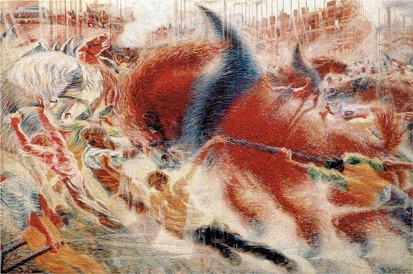
Umberto Boccioni: The City Rises (1910)
" … such issues get "disgusted," a pitch perfect description of the human condition."
A subscription to the local paper seems essential to life in this small city. I've long written letters to the editor, engaging in a decades-long arm's-length conversation with my fellow citizens, some of whom complained when they published my letters sent from Takoma Park, Maryland or Golden, Colorado, but the editor explained that I am a hometown boy. The letters run from apparently originally scribbled in fat crayon by someone unfamiliar with the difference between more and fewer to third person twice-removed scolds from retired college professors. All letters are welcomed and almost all published, though they rejected my back-handed ode to Gerard Manley Hopkins "I Think That I Will Never Know Anything As Lovely As A Light Pole" written to complain about the power company savaging our lovely trees. I rewrote it as rhyming prose and in it went. I probably qualify as a frequent offender and feel damned proud of my contribution to civil discourse and exasperation. I take particular pride, like many submitters apparently do, poking at the other side, though I prefer a certain subtlety when I chide. The outright attack shows little tact and probably fails to impress or convince anyone it's actually aimed at. I prefer a certain humbly-professed ignorance as if I didn't actually know best, though I usually believe that I do know better than the fat crayon folks.
Most days, the paper features three or four fresh letters.
Filament
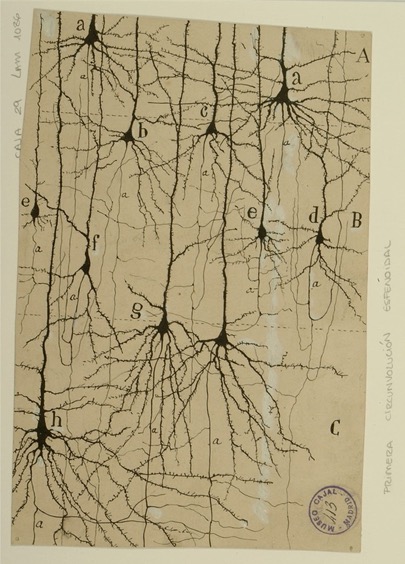
Santiago Ramón y Cajal: Sphenoidal cortex in a 25-day old infant (circa 1929)
" … it probably well-serves us if we can supplant our desire to know for certain with at least a little continuing faith."
In a perhaps apocryphal account of Edison's search for a workable Filament for his envisioned light bulb, his research team investigated around 6,000 substances, many of them carbonized, ranging from bamboo into complex metal alloys. His research involved engaging in an almost infinite search destined to almost always disappoint. I suppose faith in his envisioned outcome kept him going, that and a certain hubris he was well known to possess. Our SettlingInto has taken on similar proportions as we try on various alternative arrangements of our same old possessions, none of which seem immediately correct. Our faith—in turns flagging and surging—in ever finding that perfect combination fuels us forward. All infinite searches must be faith-based initiatives. The old advice about simply envisioning a future then moving toward it guided by mysterious Laws of Attraction amounts to aging New Age claptrap and probably hurts much more than it helps. Infinite searches, those engaged in within innumerable emerging parameters, cannot be successfully concluded by either hope or rigorous method, but probably only by means of Happy Accident, like Edison's Filament discovery most likely was.
Happy Accidents seem invulnerable to engineering discipline and rigorous process.
Staying@HomeSyndrome

William Crozier: Rainbow's End (1965-70)
"I'm taking my mask and hand sanitizer along for reassurance."
In April 1952 in Asheboro, NC, John Phillips, an eighteen year old black man, was arrested on sexual assault charges. Sent to the state mental hospital, he was classified as a "moron" with the mind of a seven year-old child. His lawyer entered a guilty plea and a judge sentenced him to life imprisonment. By 1991, Philips had become the state's longest serving prisoner and his family and inmate rights' groups were lobbying for his release. Interviewed more recently in prison, Philips insisted, "I ain't going nowhere. Too many fools out there." He had become that rarest of rare exceptions, a prisoner who refused his own freedom. I relate to him this morning.
Today's the day I've waited for since fourteen months ago when I first entered sequestration from This Damned Pandemic.
OverDoing
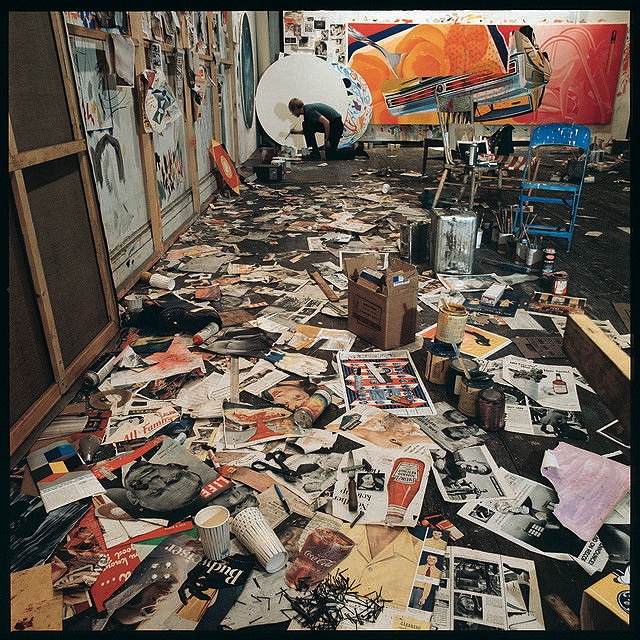
Ugo Mulas: James Rosenquist, New York (1964)
"What other choice have I got if I want to develop good judgement?"
My enthusiasm easily overwhelms my ability. I imagine a task completed and, thanks to decades of training and experience, I hold the self-discipline to see that task through to completion without noticing that I might have been OverDoing. I'm rewarded by an aching back and an unwanted slack day as I recover from the self-inflicted injury. Nothing serious, just the usual products of excess: achy back, swollen hand, gripy knees. So much demands doing and I've been aching for years to engage, though a man my age might not expect to immediately bounce back as he used to. It daily becomes clearer that I have yet to develop adequate judgement to determine what's reasonable to expect of myself. I cannot quite find the rhythm of this place yet, but it's only been a couple of short weeks in unusual circumstances since we started SettlingInto. A rhythm might emerge over longer time, once I've addressed initial imperatives. Once in maintenance mode, I should be up to the challenges, or so I tell myself. I can't know yet.
An old adage insists that three instances of bad judgement produce an accident, and that the only reliable way to produce good judgement comes from surviving a few accidents.
Unmirroring

Jan van Eyck: The Arnolfini Portrait (Giovanni Arnolfini (?) and his Wife) (1434)
"Even absent mirrors reflect something."
In modern America, place has come to hold little meaning, for technology allows us to mirror many perspectives. I'm not tied to the view out my window as my forebears were, but I can choose to peek into a seemingly infinite variety of world views, though I mostly choose only a narrow array of them. Between television and the (damned) internet, I hold access to innumerable alternative realities. I might not have access to actually experience Springtime In Paris this year, but I can certainly get glimpses of the place anytime I want. Our houses sometimes seem like containment vessels more than dwellings, with mirrors and screens standing in for actually first-hand seeing anything. Fortunately, back in 1907, the designers of The Villa Vatta Schmaltz were shortsighted enough to fail to build a room fit for television, so we're still undecided where to place ours. We have not even connected the (damned) thing yet and do not miss its distracting presence. Mirrors, at the current stage of moving into, still sit in their boxes, so, consequently, I can't even gawk at my own reflected image as I move around the place. I spend considerable time looking out windows absorbing an actual sense of place, these days, a rare form of grace.
I realize that I've spent much of my life mirroring.
FutureClash
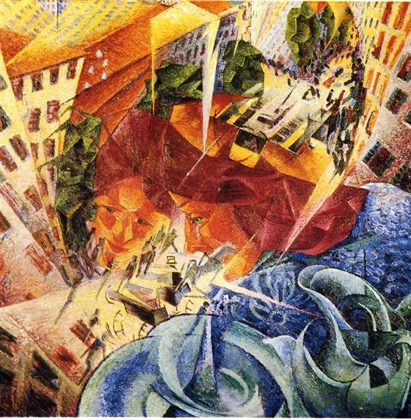
Umberto Boccioni: Visioni Simultanee [Simultaneous Visions] (1912)
" … I'll settle for what the present offers and keep dreaming forward."
Future spends most of its existence anticipating, though a few significant events find present and future encountering each other. These meetings sometimes produce sparks, for I expend little energy moderating my visions. I tend to spawn them in almost exclusively expansive forms, suspending those physical laws reserved for presents and pasts. In my future, anything might happen, and I cast even uncertainty as less of a barrier than I should probably expect it to be. I can revel there, suspended within my Utopian projections, and usually believe that my imagined future waits impatiently for my arrival. Reality, the traditional buzz-kill of dedicated dreamers, steps in somewhere to throw some cold water on the dreamer, though not even a freezing Bucket-Challenge intervention tends to blunt the more alluring imaginings.
In this culture, we learn early to firmly believe in The Future, for it seems to hold our destiny, our ultimate achievements.
StuffSettling
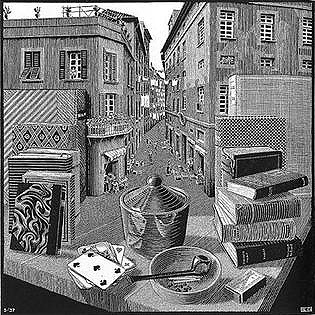
M.C. ESCHER: Still Life and Street (1937)
" … we inherit the puzzles we probably need."
The Muse and I might have forgotten that SettlingInto requires negotiating settlements, not only between us, but the stuff insists upon participating, too. This creates the most curious collaboration, for regardless of how much The Muse or I might prefer a particular placement, the stuff retains a voice, and one likely to trump our best collective judgement. This process leaves many boxes in extended suspension and negotiations continuing ad nauseam and beyond. Even should we manage to quickly place something, the stuff retains the right to re-open negotiation, making for a several stage process for some items. Many boxes represent certain contention and so are set aside to open later or never. The idea that we might quickly empty boxes and just get on with a settled life here now clearly seems out of any question. We'll be living in extended suspension as a necessary condition for ultimately SettlingInto, as our StuffSettling ultimately dominates the production.
The Muse has been installing shelf paper, by tradition her obsession when arranging a kitchen.
Stymie
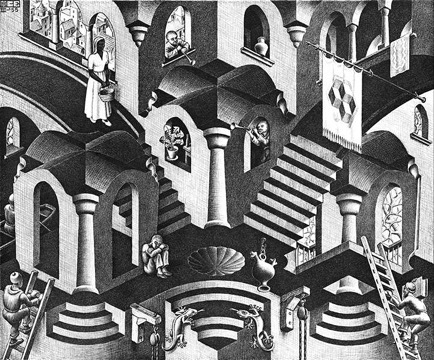
Maurits Cornelis Escher: Convex and Concave (1955)
" … fresh stories can successfully reframe even old and entrenched expectations."
The peeing boy fountain in the backyard pond, reminiscent of the famous one in Brussels, this week started exhibiting symptoms of possible prostate problems. His flow, recently manic, had slowed to an unrespectable trickle. I called The Muse's son, who had replumbed the guy during his tenancy here, and he drove over to 'splain the pipes. He introduced me to his very clever ramrod contraption and demonstrated disassembly and deployment, but the trickle persisted. Yesterday, I decided to conduct a more thorough exam, pulling the pump and subjecting all hoses to the high pressure water treatment. Each hose in turn produced more than adequate volume. I scrubbed off the slimy pump, then, in a sudden sleet storm, hooked all the parts back together. Hardly a trickle. Realizing that I'd just entered The Stymie Zone, I turned off the pump and retreated to someplace warm to dry off and consider my situation.
This was not an unfamiliar experience here, where chores roughly separate into two broad categories: those which can eventually be successfully completed and those that never will.
LastWeek

Max Klinger: The Release of Prometheus (late 19th–early 20th century)
"I wonder who I will have turned out to be after I lift my veil."
Thirteen months ago this week, I half-heartedly decided to lock myself down for the recommended two weeks as my patriotic contribution to combating The Damned Pandemic. I figured, if unenthusiastically, that it might be the least I could do and still feel as though I'd contributed to the betterment of humanity. I would not be performing any heroic open heart surgeries or volunteering to scrub ventilators in any hospital, and it would only be for a fortnight, just long enough to break the thread of infection, then we'd be back to normal. Thirteen months later, I'm still sequestering, which means I stay mostly at home, going out only when absolutely necessary or to take a sanity-promoting drive to nowhere. I've become quite the hermit since, each week extending my original two week commitment to contribute my little bit toward the continuation of our society. This might well prove to be my LastWeek under such quarantine.
I say "might well prove to be my LastWeek" because I hold the same level of certainty about the ready cessation of these hostilities as I unknowingly held thirteen months ago.
PreCycling
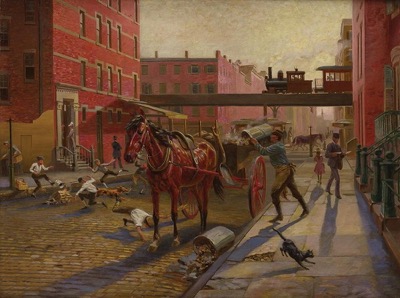
Louis Maurer: View of Forty-third Street West of Ninth Avenue (circa 1883)
"Convenience seems SO over-rated."
More than a decade ago, this small city stopped recycling glass. They first tried smashing it up to mix with asphalt to produce so-called glassphalt for paving roads, but immature technology and the incoming stream quickly overwhelmed that strategy. Now it just gets dumped into the landfill where it should retain much of its original character for centuries because it's just too expensive to ship it off to Portland's glass foundry to be melted for reuse. Couldn't each user pay a recycling tax or something to balance the market price? Since Trump bungled a trade deal with China, the plastic we used to export there for recycling and reuse has likewise been routed directly to your local landfill where it will also retain much of its original character far into the unforeseeable future. The Petroleum Institute spends millions advertising how their plastic products are 100% recyclable, but most of this nation maintains no facilities for actually recycling any of it. That plastic bottle of imported water should outlive your great great grandchildren. The primary benefit from all this landfilling might eventually become the ease with which future generations should be able to research our profligately shortsighted nature. We inhabit an out-of-sight-out-of-mind society yet continue to believe ourselves somehow enlightened.
Since relocating here with the intention of SettlingInto the place, I've caught myself changing what I purchase.
ContextKeeper

A scene (AZUMA YA: East Wing) of Illustrated scroll of Tale of Genji (written by MURASAKI SHIKIBU (11th cent.). The multi-panel curtain at the center bottom of the image is a kichō. The decorated sliding door panels at the top of the image are fusuma. The scroll was made in about ca. 1130 ACE and is in the Tokugawa Museum in Nagoya, Japan.
"Most look high into the heavens for his presence …"
In my grade school they were called custodians and wore beige mufti outfits. They manned the mops and brooms and kept the furnace fed. They kept the place waxed and spotless. They mowed the lawn and repaired broken windows. They seemed invisible, beside the point of the place, which was satisfying the solemn responsibility of educating future generations, and yet without their contributions, satisfying that goal would have proven impossible. They were the ContextKeepers, and every building, every institution depends upon them. They empty the garbage and clean the toilets and carry the keychain providing access to every square inch of the place. Not even the Senior Executive Director carries that much authority. I secretly aspired to grow up to become one of them, managing a loading dock all my own, a benevolent invisible man, utterly dependable.
SettlingInto this old house, I catch myself slipping into my role as ContextKeeper here.
GoodGrief

Benjamin West - The Pilgrim Mourning His Dead Ass (1800)
"I prefer to believe that it might ultimately contribute to a half-decent cheese sandwich or something."
When exasperated, Charles Shultz' cartoon character Charlie Brown would resort to his signature, "Good Grief" in response. I interpreted his comment as a mildly updated form of the classic, "Danged Nab-it," suitable for readers of all persuasions and ages, but I've more recently come to consider GoodGrief in its more literal sense. Perhaps grief, universally associated with the worst experiences, exists as an unsuspected good. There's often a huge difference between doing well and feeling good about a result, between tasting good and actually being good for you, so it seems not an outlandish stretch to wonder if grief, too, might somehow carry considerable goodness within it. If so, what distinguishes good grief from bad? How might I reap the benefits of GoodGrief and limit the damage from bad?
Grieving's personal business and, to my mind, not really open for public dissection.
Resurrection

Giovanni di Paolo (Giovanni di Paolo di Grazia): Paradise (1445)
"Resurrection seems unnecessary to bring forth any presence still living within our hearts."
From one perspective we might seem to be resurrecting the old Villa Vatta Schmaltz so that we can set about Settling (back) Into it, but we ain't doing that. The Villa of the past still resides there, I guess, but The Villa of the present only distantly resembles its forebear. Its former self was more tumbledown than the present instantiation, and desperately needed painting. The current version still wants considerable work, but we've made progress over time, not to restore it to what it once must have been but to reclaim it from the otherwise inexorable clutches of time. Houses and especially homes seem especially subject to what are known as The Ravages Of Time, but they also face The Ravages of past, present, as well as future. Earlier stewards of this place attempted updates that aged poorly. We're taking it slowly and trying to more thoughtfully stabilize this place's presence into the future. We are not now and never have been in the Resurrection business here.
We might be occupied introducing this place and ourselves to our future together.
Dirty

Jean-François Millet: Garden Scene (1854)
"Today seems like the day to finally get up and Dirty."
During exile, the dirt I encountered amplified my sense of displacement. My home valley was blessed with remarkable soil, Loess, the likes of which only a small handful of places in this world enjoy. Deposited here by wind over millennia, it features few rocks and little organic matter. I can pull a long-tailed button weed free from it with its foot-long delicate root intact. Water slips right through it. Improved with peat or compost, it becomes perfectly friable, an extremely fine planting medium. Elsewhere, I encountered what seemed like imposters of soil, clays and hardpan scrabbles, gumbos and shallow gravels, all exhausting, unrewarding stuff with which to even attempt to work. SettlingInto seems to insist that I sink to my knees and get Dirty for a change. In the Rockies' Foothills, I came to dread working what passed for soil. In the DC suburbs, I mixed crushed leaves with the clay to create something workable, after bending my turning fork just turning over dirt more suitable for pottery than planting. I longed for better every Spring.
Now the opportunity presents itself in spades.
Done&Done-r
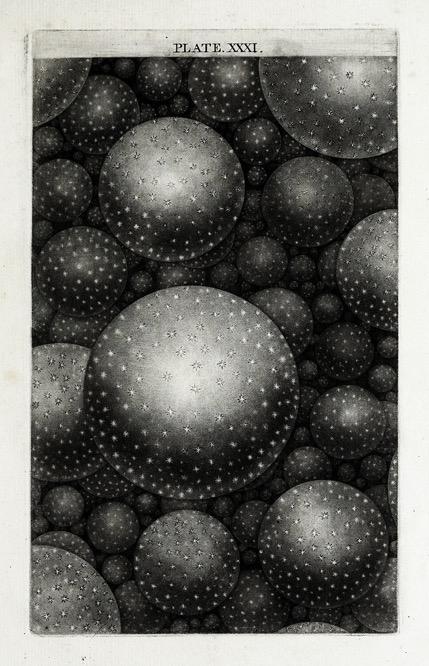
Thomas Wright: A Finite View of Infinity (1750)
"I feel reasonably confident that a fresh infinity hides in there, ready to spring itself upon me."
Both packing and unpacking fall into a unique class of human activity in that they seem to have no concluding point. A naive packer might look at a house and quite reasonably presume that packing should simply entail putting every thing within that place into a box, though that notion will prove impossible to satisfy in practice. Some items seem to have been specifically designed to not fit into any box, for instance, and others turn infinite, filling just as many boxes as one throws at them, with always a few more outstanding, ad infinitum. Flower pots pack like this. So do the contents of any typical garage. One must eventually come to some sort of accommodation with these items and acknowledge a state nestled somewhere between Done&Done-r. Insanity seems the only reasonable alternative.
Unpacking reverses while amplifying these conditions.
Fool'sMission

BARTOLOMÉ ESTEBAN MURILLO: Two Women at a Window (c. 1655/1660)
"Only idiots attempt to find themselves by mimicking another."
Baseball season begins on April Fool's Day without a shred of intentional irony. I sit in the same window I was displaced from twelve years ago, renewing my plotting against the streetlight outside. The house now filled with boxes, many holding promise and a few holding long past, utterly unresurrectable lives as Easter nears and Passover passes us by. Life sometimes seems a Fool'sMission offering nothing so much as endless opportunities for me and everybody else to make absolute fools of ourselves, just as if we already hadn't. We undertake great missions brimming over with glowing possibilities and sometimes even succeed at achieving them. Glory comes and goes like tidal action, especially success, a more demanding mistress than failure ever was, for she demands more than an odd ounce of flesh, and takes it. We're animated dust still wondering what all the fuss was about.
My darling daughter Heidi was born on this very day thirty-nine years ago today.


